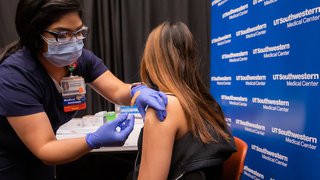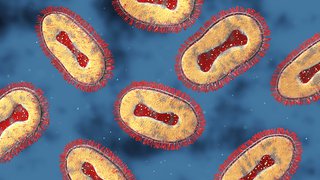The fastest vaccine ever developed was for mumps and it took four years (1963-1967).
That record will almost certainly be shattered later this year, or in early 2021, when one or more COVID-19 vaccines are expected to be approved for emergency use.
For millions of people coping with the pandemic since March, the wait probably seems interminable. But when you consider that most vaccines require at least five to 10 years of research and testing, plus billions of dollars to produce, the collective effort to create a safe, effective COVID-19 vaccine in less than 12 months seems fairly remarkable.
The Making of a COVID-19 Vaccine
See how the complex process works and how it has been accelerated to combat the pandemic.
When is the soonest a vaccine is likely to be approved?
By mid-October, nearly 50 vaccines had advanced to human clinical trials and several appeared to be entering the home stretch. In late November, vaccines created by Pfizer, Moderna, and AstraZeneca were all ready to be submitted to the U.S. Food and Drug Administration (FDA) for emergency use and each was reported to be at least 90% effective in Phase 3 clinical trials. It’s important to note, however, that even after a vaccine is approved by the FDA, it won’t be available to the general public right away. Depending on distribution and prioritization plans, it could take months for all Americans to have access to a COVID-19 vaccine.
When would most people be able to get the vaccine?
States submitted preliminary distribution plans to the Centers for Disease Control and Prevention (CDC) on Oct. 16, but there are still many unknowns, such as:
- What are the storage, refrigeration, or freezing requirements for the vaccine(s)?
- Which groups of people will get vaccines first?
- How many doses will be available?
- Will individuals need one dose or two?
Several of the vaccines in development require two doses separated by 21 or 28 days.
In Texas, the first wave of vaccines is expected to go to the most “vulnerable” populations, including frontline healthcare workers, people over age 65, and people with underlying medical conditions that could increase their chances of severe complications from COVID-19. Several manufacturers have been mass producing their vaccines in parallel with clinical trials, so that may expedite the rollout. Distribution plans for a second and third wave of recipients will remain fluid, largely based on the availability of the vaccine.
UT Southwestern is making preparations to deliver a vaccine. Our physicians and researchers also continue to conduct clinical trials for life-saving therapies for COVID-19, which will be a key component of bringing the pandemic under control.
Will things return to normal once there’s a vaccine?
Anticipation remains understandably high for a COVID-19 vaccine, but mitigation strategies such as wearing masks, social distancing, and practicing good hand hygiene, will remain important tools to limit the spread of the virus during a vaccine rollout, which could take months. Together with increased treatment options and mitigations strategies, a vaccine will add to the overall ability to diminish transmission risk within the community.
How will we know if a vaccine is safe and effective?
Any vaccine that advances to Phase 3 clinical trials, which involves testing on tens of thousands of people, has to prove itself to be at least 50% effective in creating antibodies against the virus with limited side effects. The FDA will not approve a vaccine that can’t clear that hurdle.
The FDA will continue to monitor the vaccine in real-life scenarios and if significant safety or efficacy concerns develop, the FDA could withdraw its approval.
Scientists and physicians have a compelling tradition of conquering viruses such as polio and smallpox, and protecting the public from threats such as measles, mumps, and influenza.
Whenever a COVID-19 vaccine becomes available, it will mark a triumph for science and discovery, and also provide some much-needed relief from this unprecedented pandemic.
Pandemic Ethics
Who will get first access to a COVID-19 vaccine when one becomes available? Dr. Michael K. Gusmano, a bioethicist and public health scholar at Rutgers University and The Hastings Center, joins Dr. John Warner to discuss that question and other ethical dilemmas that have developed during the pandemic.











